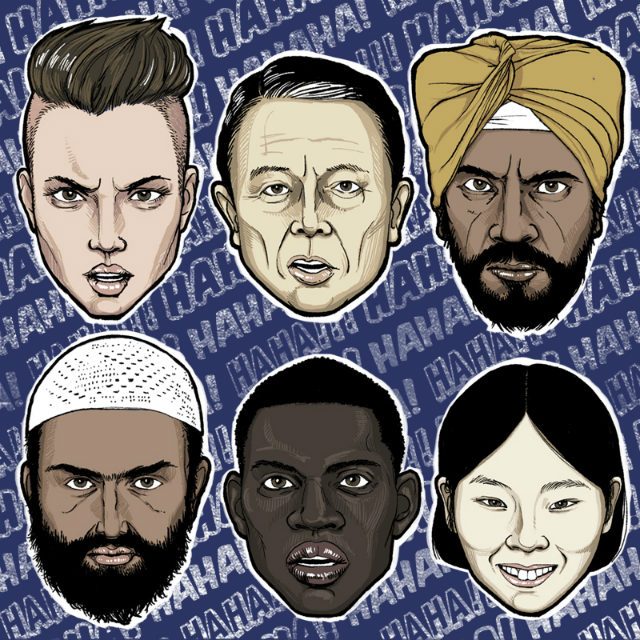SUMMARY
This is AI generated summarization, which may have errors. For context, always refer to the full article.
 “Chinese, Japanese, Filipino, negro!”
“Chinese, Japanese, Filipino, negro!”
We said this line in unison as we stood in a circle, pointing to each person when we mentioned each race. We pulled the edges of eyes upward for Chinese, downward for Japanese, and pressed our noses flat for Filipino.
“Negro” was the punchline. That meant you were the loser. That meant I would point to your face the way you would point to mine if that word landed on me.
We would scream, “Hahaha, negro! Negro, negro, negro!” and laugh, run and tell all our other friends that X was negro, and that they should all make fun of him for the rest of the day.
Before even stepping foot in a school, we all knew from that rhyme that being negro was the worst thing to be. Nobody wanted to be negro, even if none of us had ever met a person outside our race. Being called negro meant something undefined but definitely undesirable, something to do with skin color defining everything we could or couldn’t be.
“Girl, boy, bakla (gay), tomboy (lesbian)!” Was another game we played as we pointed fingers in a circle. “Girl” and “boy” were the ideal things to land on you, “bakla” being the worst, the lesson being that if one couldn’t be a girl or a boy, it was better to be a lesbian than a gay man. Early on we are taught the hierarchy of genders and sexual orientations, way before our first crush and before we even know anything about sex.
“Indian pana kakana-kana”
We didn’t spare the minorities around us either. When an Indian man in a motorcycle would pass, we would elbow each other and say, “Uy, bumbay o. Pautang 5-6!” referring to the loan shark businesses some of them had. “Gusto mo bili payong?” some would go on to mock their business sense. I’ve never met an umbrella-selling Indian man, but apparently they were common back in the day.
Sikh Indians with their turbans and full beards were considered devious, so adults routinely threatened misbehaving kids by saying, “Hala, kukunin ka ng bumbay (The Indian man is going to get you)!”
“Intsik beho tulo laway!” was another taunt we learned from friends. We called Chinese Filipinos derogatory names and went as far as making excessive salivation a puzzling stereotype. “Akin na pela mo!” was another one, where not only did we make fun of Chinese people’s thrifty ways, but we also ridiculed their accents.

When we would see a foreigner, particularly a Middle Eastern person, it would be common to see the wrinkling of noses and hear, “Amoy arabo, ambaho (Stinks like an Arab)!” As a child I was also taught by adults around me that mestizas had smelly genitals and B.O.
“Hindi naliligo yan (They don’t shower),” I was told when an adult and I would come across a light-skinned person. I wondered what skin color had to do with hygiene, and how many smelly people they came across to prove that theory.
Harmless taunts?
We certainly outgrow many of these rhymes and sentiments. Anyone who has ever spent time in a school system or in social circles believes that many of these taunts are just fun and games. We meet Indian people on our own, and make friends with Chinese classmates. We may even talk to a person of Arab descent online. Our best friends may be gay, or our cousin may be a lesbian. We eventually learn that those statements were foolish to say and those games were stupid to play.
But do we really outgrow them completely? Or do these stereotypes remain in our minds even subconsciously? Sentiments like these that are ingrained early on maintain the belief we are better than other races, and that people who don’t look or act like us must be different from us – they must be smelly, they must salivate excessively, and they must be obsessed about money.
Would it really be too much to see in people of other races or sexual orientations something we all have in common? Would it be impossible to think of everyone as equal and the same?
The golden rule
Filipinos are so pikon (sore losers) and we are quick to be enraged at every single comment about us. Remember the rallies following the Hong Kong satirical column pegging the Philippines as a nation of servants? There was never anything wrong with being a maid, but we are repeatedly and collectively hurt by that stereotype that a servant is all we could be.
How would we feel if children in other countries played a game portraying all Filipinos as maids or as mail-order brides? How would we feel if other races played a game where “Filipino” was the loser, and where kids learned that to be called Filipino would mean the lowest of the low, something that was laughable, a dirty name with which to be tormented all day?
Treating children’s games as harmless fun teaches us that the subjects of our racist play should just shrug and laugh. By deeming all Indians or Arabs devious and dirty, we limit their existence to these stereotypes and want nothing else to do with them. By considering the mannerisms of effeminate men as subjects of humor, we teach kids that making fun of gay people is part of childhood, and that gays should just be good sports (“Biro lang naman, diba?”). Moreover, it teaches children that femininity is something inferior and a source of humor. This is dangerous thinking for both man and womankind.
It starts at home
Bias and bigotry start young, and most importantly they start at home and in child’s play. Let’s reexamine what we feed our kids about those who are different from us. It’s for their own good especially in an increasingly global culture.
Question: What other racist or sexist remarks did you hear as a child or said during playtime? Would you correct your child now if you heard it from them? – Rappler.com
Add a comment
How does this make you feel?
There are no comments yet. Add your comment to start the conversation.